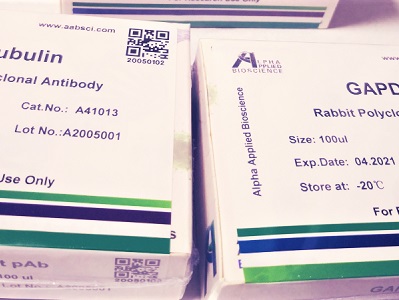

EphA2/5 (phospho Tyr594) rabbit pAb
Cat :A14124
-
Source
Rabbit
-
Applications
WB,ELISA
-
Reactivity
Human,Mouse
-
Dilution
WB: 1:500 - 1:2000. ELISA: 1:10000. Not yet tested in other applications.
-
Storage
-20°C/1 year
-
Specificity
Phospho-EphA2/5 (Y594) Polyclonal Antibody detects endogenous levels of EphA2/5 protein only when phosphorylated at Y594.
-
Source/Purification
The antibody was affinity-purified from rabbit antiserum by affinity-chromatography using epitope-specific immunogen.
-
Immunogen
Synthesized phospho-peptide around the phosphorylation site of human EphA2/5 (phospho Tyr594)
-
Uniprot No
P29317/P54756
-
Alternative names
EPHA2; ECK; Ephrin type-A receptor 2; Epithelial cell kinase; Tyrosine-protein kinase receptor ECK; EPHA5; BSK; EHK1; HEK7; TYRO4; Ephrin type-A receptor 5; Brain-specific kinase; EPH homology kinase 1; EHK-1; EPH-like kinase 7; EK7; hEK7
-
Form
Liquid in PBS containing 50% glycerol, 0.5% BSA and 0.02% sodium azide.
-
Clonality
Polyclonal
-
Isotype
IgG
-
Background
EPH receptor A2(EPHA2) Homo sapiens This gene belongs to the ephrin receptor subfamily of the protein-tyrosine kinase family. EPH and EPH-related receptors have been implicated in mediating developmental events, particularly in the nervous system. Receptors in the EPH subfamily typically have a single kinase domain and an extracellular region containing a Cys-rich domain and 2 fibronectin type III repeats. The ephrin receptors are divided into 2 groups based on the similarity of their extracellular domain sequences and their affinities for binding ephrin-A and ephrin-B ligands. This gene encodes a protein that binds ephrin-A ligands. Mutations in this gene are the cause of certain genetically-related cataract disorders.[provided by RefSeq, May 2010],
-
Other
EPHA2/EPHA5, Ephrin type-A receptor 2/5
-
Mol.Wt (Da)
108266
-
Concentration
1 mg/ml
| Product | Reactivity | Applications | Conjugation | Catalog | Images |
|---|
-
 400-836-3211
400-836-3211
-
 support@aabsci.com
support@aabsci.com
-
β-actin rabbit pAb ...... >
-
β-actin rabbit pAb(A284) ...... >
-
Plant-actin rabbit pAb ...... >
-
β-tubulin mouse mAb(M7) ...... >
-
GAPDH mouse mAb(2B8) ...... >
-
GAPDH mouse mAb(PT0325) ...... >
-
Histone H3 rabbit pAb ...... >
-
Histone H3 rabbit pAb ...... >
-
COX IV mouse mAb(6C8) ...... >
-
GFP-Tag mouse mAb(1G6) ...... >
-
HA-Tag mouse mAb(1B10) ...... >
-
mCherry-Tag mouse mAb(6B3) ...... >










 400-836-3211
400-836-3211
